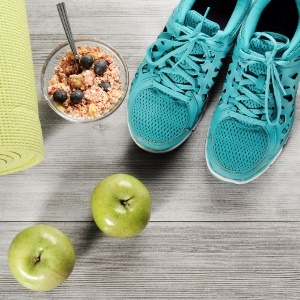
Do you work out better on an empty stomach or with a little something in the tank? And is it better to eat before or after a work out?
Catherine Viljoen, a registered biokineticist says the decision to eat before a workout or afterwards depends on a few factors:
Do you want to get the best out of your training session?
“If you have breakfast or a snack before your workout it will help you train harder for longer compared to exercising on an empty stomach,” she says, adding that it will also likely also help you recover faster after your session as energy reserves will not be depleted.
“A long or hard session on an empty stomach or low energy reserves also means your body's stress response is higher and your immune defence is compromised. This is not ideal particularly if you're doing several training sessions in a week or do more than one session in a day,” she says.
So if you train often, Viljoen says the timing of your post-workout snack is also critical and could help boost recovery and performance.
“The golden rule is to consume a meal or drink high in carbohydrates and protein as soon as possible after your session followed by a regular pattern of wholesome snacks and meals for the remainder of the day. We are not suggesting that you ingest a full English breakfast or a protein shake-type of breakfast; the best pre-training breakfast contains a wholesome source of carbohydrates - something like oatmeal for instance. Adding a small amount of protein to the carbohydrates assists in muscle building if this is your goal. Scientific studies show that this could be as little as six grams to give you maximum effects.”
Do you want to burn fat or lose weight?
If burning fat and shedding weight is your primary exercise goal, Viljoen says doing a moderate-intensity session on an empty stomach could help you burn a bit of extra fat during the session.
“However, there's a big misconception about how big and worthwhile this effect really is. Firstly, the amount of body fat you can burn during exercise is actually quite limited - and while you do burn fat it is in small quantities. The real benefits of exercise for weight loss comes more from how well it helps to raise your body's metabolic rate and to build or maintain muscle mass. Both of these factors help with fat-burning throughout a 24-hour day.
“Secondly, skipping breakfast and exercising on low energy stores makes the exercise feel harder than it really is, so you're not able to push hard for long enough. Nor does it raise your metabolic rate as much as you might have been able to if you had had a light meal before your session.”
So if weight-loss is your goal, Viljoen advises rather keeping to a pattern of wholesome regular meals, at least three times a day, and says you should practice portion control so you don’t end up putting back double the kilojoules you just burned.
Overall, Viljoen recommends you have a balanced, healthy diet the majority of the time as a bad diet will cancel out most of your efforts at the gym and what you eat before or after your session won’t make much difference then.
Reference: Catherine Viljoen, registered biokineticist, Virgin Active.
Read more:
Post your fitness-related questions to FitnessDoc




 Publications
Publications
 Partners
Partners










